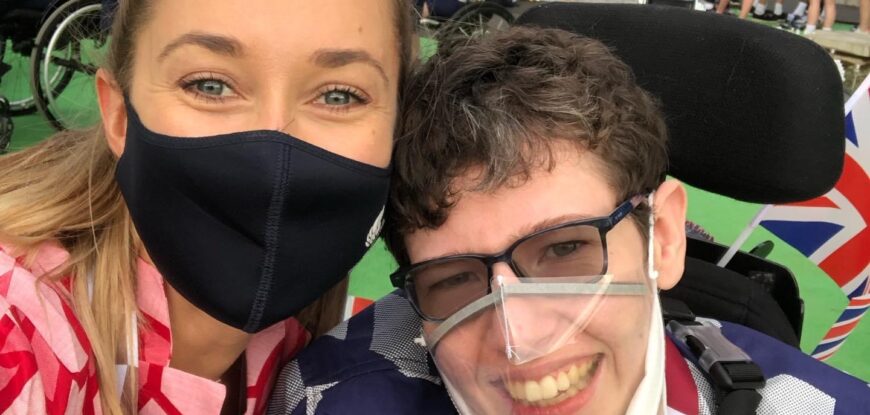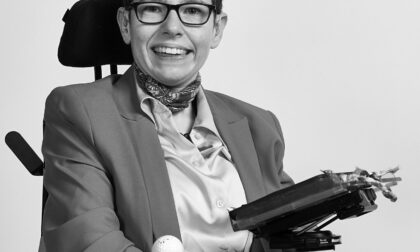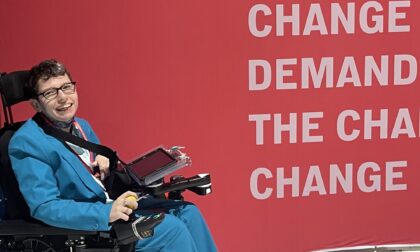Elite-level sport must be the only time in life when you are expected to wee in front of an absolute stranger. It’s necessary to prove that the sample of urine you are producing has come from you, and you alone. Until I entered the Boccia World Class Programme (WCP) I hadn’t realised just how much time and effort it takes to prove you are staying clean. We’ve all heard the press stories about people getting caught, and banned. Suddenly this was a whole new, very serious, experience and I was in it.
Staying clean is my responsibility
It is the athlete’s responsibility to know whatever we are putting into and onto our body is safe. That means being in the know and staying clean. Under no circumstances can you slip up. And the ‘I didn’t realise’ or ‘I didn’t know’ response is not a defense. If you test positive for a banned substance there is a lot at stake.
Initially, on joining the World Class Boccia Programme I attended my first obligatory anti-doping session. In content, it was not really different from the couple I’d done when I was Frame Running. As a result, I thought ‘OK, I’ve got this’. But over time we did more courses, often online. The seriousness of staying clean and being well educated became clear. This cumulated in a massive World Anti-Doping (WADA) very detailed course in preparation for Tokyo, which took me several hours!
The 100% Me UKAD athlete website has really useful guidance and can be downloaded as a useful app.
Testing for banned substances
Every single thing you put into your body, or onto your body, of a medicinal nature needs to be thoroughly checked. This is done through a platform called ‘Global Dro’. This includes all prescription medication and over-the-counter stuff you can buy in pharmacies and supermarkets. And, then there are supplements. Think now of topical heat or cold treatments, pain killers, throat lozenges, and barrier creams. Now add hay fever tablets, vitamins, and much, much more. Sometimes a brand name isn’t listed so you need to check the ingredients. Each individual item checked needs a reference number and the paperwork printing. Then, these need storing securely in your personal luggage. You need to have them immediately to hand when you get called for a test (along with ID). My list of what seems innocuous things I use occasionally at home stretched to 3 summary pages and around 30 items.
Needing the GP on board
Certain drugs also need a TUE (a therapeutic use exemption certificate). These are items that can only be taken in exceptional circumstances. This means sitting with your doctor if you are ill and checking out first if it’s on the Global Dro website. Sometimes you then need a TUE and approval to take suitable meds, it starts by using the TUE Wizard on the UKAD website, which the doctor has to endorse. Fortunately, I haven’t needed any of this which definitely saved even more work!
My GP was amazing, for Tokyo we were asked to take with us all prescription medication we might need if we were ill. This included anti-biotics for ears (wearing hearing aids I’m more prone to infections) and urine infections. I also needed him to do letters for authorisation paperwork as I take codeine intermittently for chronic pain. This is a banned substance in Japan. As a result, I needed special permission from the Japanese government to import the tablets I might need. Oh, and then export any tablets I didn’t use.
Missing my first drugs test
Prior to Tokyo, I knew my teammates had been getting UK Anti-doping officials calling randomly at their homes. Usually, this happened on an evening. One Friday night I had been Frame Running at the local track. When I got home about 8.30 pm I’d gone straight upstairs to get into the bath. I had a lovely soak, getting into bed eventually at about 10 pm. My house runs on environmental controls with notifications to my phone. This means I have my doorbell notifications switched off at 8 pm so I don’t get disturbed if I’m bathing. Even if someone bangs on the front door with the bathroom at the back of the house I’m unlikely to hear.
Imagine my horror when I looked at my phone that I have a series of (silent) missed doorbell notifications. Because I use Ring I was able to see the UKAD person had repeatedly come to my door and rung the bell! I learned a lesson from this and have changed what I do so it can’t happen again.
Missing an anti-doping test is fortunately not the end of the world at my level on the World Class Programme. It was my first Paralympic games. But for other people, it can be. I am not on the ‘whereabouts’ list, which means I do not have to notify UKAD where I am all the time. This means my tests are random but can happen anytime without warning from early morning to late evening. Because we don’t notify where we are if I am not at home there is no penalty. But guess what, a week later at training camp guess who turned up to administer my first ever anti-doping test?
The actual test
I felt lucky that after a long day of training I’d been to the loo, then had dinner with plenty to drink. When the UKAD official arrived we were just planning on going to get ready for bed. This was a result as I was ready to perform! Along to my room came my personal assistant who had to help catch the sample, the team physio, and the UKAD person. All my paperwork was checked, we are expected to always have up-to-date Global Dro forms. There was one panic as my morning fish oil supplement wasn’t on there. After a quick phone call to my mum, I found it was, fortunately, an approved item. Nevertheless, we got this added to my forms for Tokyo!! Meanwhile, I had to observe the anti-doping forms being completed. Then, I had to observe the sample being split for dual testing before I signed everything.
The whole thing took about an hour, but the tester waits as long as it takes for a sample to be given (no pressure there then). You don’t get given results unless there is an issue so we assumed everything was good.
Staying clean …. It’s a good thing…..
Whilst the paperwork is a bit of a hassle, now I’ve had my first test the fear of having to give a sample has gone. It is just something we have to do, and everyone was matter of fact and professional. Anti-doping is just a small hurdle to the huge privilege of representing Great Britain. The bonus is we know all other athletes are undergoing the same strenuous testing which levels the playing field for all.
Following Tokyo, I promised a series of blogs about my Paralympic experience. You can read about the overall experience in Tokyo News, and about how I think being an AAC user helped me in my quest to become a Paralympian.
You can click here to find out more about my boccia journey.





If you found this interesting or
helpful please feel free to share.